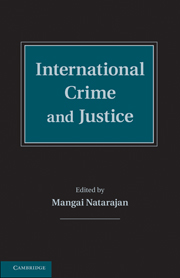Book contents
- Frontmatter
- Contents
- List of Figures
- List of Tables
- List of Contributors
- Foreword
- Preface
- Introduction
- Part I International Criminology
- Part II Law, Punishment, and Crime Control Philosophies of the World
- Part III Transnational Crime
- Part IV Organized Crime and Terrorism
- Part V International crime
- Part VI Delivering International Justice
- 44 The Role of the United Nations
- 45 Treaties and International Law
- 46 International Criminal Tribunals and Hybrid Courts
- 47 The International Criminal Court
- 48 The ICC and the Darfur Investigation
- 49 Victims’ Rights in the International Criminal Court (ICC)
- 50 Nongovernmental Organizations and International Criminal Justice
- 51 Global and Regional Human Rights Commissions
- 52 The Truth and Reconciliation Commission in South Africa
- 53 The Guatemalan Truth Commission
- Part VII International Cooperation and Criminal Justice
- Part VIII International Research and Crime Statistics
- Part IX International research resources
- World Map
- Index
- References
50 - Nongovernmental Organizations and International Criminal Justice
Published online by Cambridge University Press: 05 October 2014
- Frontmatter
- Contents
- List of Figures
- List of Tables
- List of Contributors
- Foreword
- Preface
- Introduction
- Part I International Criminology
- Part II Law, Punishment, and Crime Control Philosophies of the World
- Part III Transnational Crime
- Part IV Organized Crime and Terrorism
- Part V International crime
- Part VI Delivering International Justice
- 44 The Role of the United Nations
- 45 Treaties and International Law
- 46 International Criminal Tribunals and Hybrid Courts
- 47 The International Criminal Court
- 48 The ICC and the Darfur Investigation
- 49 Victims’ Rights in the International Criminal Court (ICC)
- 50 Nongovernmental Organizations and International Criminal Justice
- 51 Global and Regional Human Rights Commissions
- 52 The Truth and Reconciliation Commission in South Africa
- 53 The Guatemalan Truth Commission
- Part VII International Cooperation and Criminal Justice
- Part VIII International Research and Crime Statistics
- Part IX International research resources
- World Map
- Index
- References
Summary
INTRODUCTION: THE ROLE OF “CIVIL SOCIETY” AND THE HISTORY OF NGOS IN INTERNATIONAL CRIMINAL JUSTICE
Although it has long been recognized that citizens working together are effective pressure groups for social change, only recently have scholars researched the role of “transnational civil society”: organized citizens who work for global social. In the study of international criminal justice, students are often introduced to the study of national, intergovernmental, or supranational bodies that enforce and interpret national and international law, but rarely to the work of nongovernmental organizations in the delivery of criminal justice-related services and the lobbying for policy changes. This chapter aims to fill that gap by presenting an overview of the work of nongovernmental organizations that is relevant to international criminal justice.
WHAT IS AN NGO?
NGO, an abbreviation for nongovernmental organization, is an international term used to denote formally registered organizations that are not part of the state or otherwise governmental apparatus nor the profit-making sector of the economy. They are commonly referred to as “civil society,” and in various contexts are also called “nonprofit” or “voluntary” organizations. Of course, there are many such organizations in the world, and not all are directly relevant to international criminal justice. The civil society database of the UN Department of Economic and Social Affairs lists more than 13,000 organizations with international interests, and more than three thousand who have been granted consultative status with the United Nations. Those NGOs that aim to influence international criminal justice policy because their main mission, aims, or activities are directed at policy or intervention arenas in international criminal justice are those that are of interest to this chapter.
- Type
- Chapter
- Information
- International Crime and Justice , pp. 380 - 385Publisher: Cambridge University PressPrint publication year: 2010



